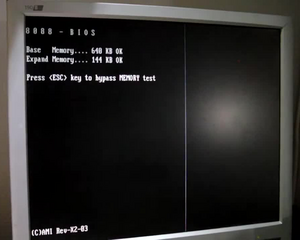m (Rueni97 moved page AMIBIOS 2.0x to AMIBIOS Rev-X2-03: AMIBIOS 2.0x labelling might just be an assumption.) |
No edit summary |
||
| Line 1: | Line 1: | ||
[[File:AMIBIOS_Rev-X2-03_POST.png|thumb|POST screen of AMIBIOS | [[File:AMIBIOS_Rev-X2-03_POST.png|thumb|POST screen of AMIBIOS subcore Rev-X2-03]] | ||
AMIBIOS | AMIBIOS Rev-X2-03 is a subcore for an unknown core version of [[AMIBIOS]], assumed to be made by Access Methods (which then would sold AMIBIOS to [[American Megatrends]]). This specific subcore is assumed to be released in 1985 or early-1986. | ||
Rev-X2-03 seen on an IBM XT clone motherboard [https://www.youtube.com/watch?v=4AD3sgvuBNs demonstrated by the YouTube channel Dfgrt924]. This is believed to be the earliest known subcore of AMIBIOS with proof to confirm it's existence. | |||
== POST screen == | == POST screen == | ||
The POST screen is different from all other known versions of AMIBIOS. The 8088-BIOS text at the top and the memory test counters all look different. This version also has two memory counters (one for base system memory and other for expanded memory that could be additionally installed), instead of only one as seen in newer versions. | The POST screen is different from all other known versions of AMIBIOS. The 8088-BIOS text at the top and the memory test counters all look different. This version also has two memory counters (one for base system memory and other for expanded memory that could be additionally installed), instead of only one as seen in newer versions. | ||
This version also seems to lack a proper BIOS string, while AMIBIOS 2.2x already had a string, indicating the string was introduced with | This version also seems to lack a proper BIOS string, while AMIBIOS 2.2x already had a string, indicating the string was introduced with 2.2x or a slightly earlier version. It says "Rev-X2-03" where the string would go with future versions. | ||
The BIOS also lacks a setup launch prompt, which is usual for early IBM PC compatible BIOSes. Built-in setup utilities started becoming common in around 1987. | The BIOS also lacks a setup launch prompt, which is usual for early IBM PC compatible BIOSes. Built-in setup utilities started becoming common in around 1987. | ||
Revision as of 06:09, 3 December 2022

AMIBIOS Rev-X2-03 is a subcore for an unknown core version of AMIBIOS, assumed to be made by Access Methods (which then would sold AMIBIOS to American Megatrends). This specific subcore is assumed to be released in 1985 or early-1986.
Rev-X2-03 seen on an IBM XT clone motherboard demonstrated by the YouTube channel Dfgrt924. This is believed to be the earliest known subcore of AMIBIOS with proof to confirm it's existence.
POST screen
The POST screen is different from all other known versions of AMIBIOS. The 8088-BIOS text at the top and the memory test counters all look different. This version also has two memory counters (one for base system memory and other for expanded memory that could be additionally installed), instead of only one as seen in newer versions.
This version also seems to lack a proper BIOS string, while AMIBIOS 2.2x already had a string, indicating the string was introduced with 2.2x or a slightly earlier version. It says "Rev-X2-03" where the string would go with future versions.
The BIOS also lacks a setup launch prompt, which is usual for early IBM PC compatible BIOSes. Built-in setup utilities started becoming common in around 1987.
Boot error messages
There are two boot errors seen in the demonstration, the first error message that reads Drive not ready Insert diskette in A: Press any key ..... appears when a floppy drive is either not installed or can't boot to a disk yet. While the second Boot failure Insert diskette in A: Press any key ..... error appears when there is not a valid boot disk in the drive. These messages are similar to the ones seen on newer AMIBIOS versions, although slightly different.